#Dr. Gaul
Text
there's something to be said about Coriolanus, an 18-year-old boy, writing an essay about the parts of war he enjoyed and listing mainly things that connected him to his family, that brought his loved ones closer, that gave him and his family hope
then adding a bit about control and power right at the end as a direct response to his very recent traumatic experiences wrought by the Capitol's oppression.
and that being the bit that Gaul latched onto. that Gaul insisted he extrapolate, and pick at, and examine.
#jay jabbers#the hunger games#the ballad of songbirds and snakes#coriolanus snow#dr. gaul#thg#tbosas
215 notes
·
View notes
Text
"What are The Hunger Games for?" An essay on the fans' puzzling response to Snow.
This is basically my take on the entire TBOSAS discourse. [Warning: this will be long.]
The assertion that showing why a villain makes villainous choices (and why often from the villain’s POV they get reframed as morally good or right choices, so as to allow him to justify himself or self-excuse his own behavior to carry them out) is somehow “problematic” because it runs the risk of legitimizing his evilness or even praising it as a valid and commendable response to the world is by itself insulting and implicitly insinuates the idea that good and evil are not choices every human being makes, but rather independent constants that have nothing to do with each individual’s autonomy – when in fact the whole point of the book is that good and evil much closely resemble multiple differential functions whose variables can be extremely varied in both nature and number. In the case of Snow alone we already have: childhood trauma about the war, physiological trauma about starvation and malnutrition, staunch supremacist and totalitarian upbringing from Crassus and Grandma’am, poverty and scarcity that culminated in some kind of block or impairment in his physical growth and development during his teenage years and that most likely forever altered his metabolic and neurological processes to a significant degree, philosophical and ideological indoctrination from Dr. Gaul, social and economical collapse of his family’s wealth and reputation combined with the need and pressure to keep up appearances, etc. Claiming that Snow’s ultimately sick moral compass cannot derive from any of this is like claiming that nothing we experience in our formative years bears any role in shaping and defining who we become and what kind of choices we end up making.
That of Choice is, in my opinion, one of the most important themes of the book, and we really get a sense of this in the way Snow’s kills progress through the story, and particularly in how every next kill he engages in is the result of less independent variables that find themselves out of Snow’s direct control:
Bobbin; killed in straightforward self-defense after Snow is forced by Gaul to enter the Arena.
Mayfair; killed not in a life-or-death situation, but as a consequence of her threat to have both Lucy Gray and him hanged (so, this time the threat of creating a life-or-death situation is sufficient to provoke the same response).
Sejanus; killed as a result of a variety of fairly complicated variables, with most of them being directly dependent on Snow’s sphere of influence, intentions and interests, and deriving from what he deems as more important or morally correct for himself or what he believes in.
Highbottom; killed in cold-blooded cruelty and premeditation, with the murder being exclusively motivated by a desire to carry out evil without remorse, as Snow has finally reached the same conclusion Dr. Gaul was so eager to instill in him by appealing to his emotional attachment to his past and to his ambitions (which in turn stemmed from the traumas he went through), which is that every human being is actually evil at its core, and that the world is made up of victors who can exert evil with impunity and losers who just become victims of it.
Obviously Collins is not stupid and knows perfectly well that there are predispositions (also, if not mostly, genetically inherited, because at birth we all get handed a deck of cards we don’t choose and just have to learn to handle and master, whether we like it or not) that may make someone more inclined to do good or commit evil (Snow is indeed described from the start with narcissistic traits and sociopathic tendencies, but these seeds of his character get nurtured and watered instead of sublimated and eradicated because of what happens to him and the choices he’s pressured to make or deliberately chooses to carry out as a response to his circumstances), but I absolutely disagree with the kind of interpretation according to which the prequel demonstrates that Snow was always “destined” to be a villain because he was rotten right from his mother’s womb, just because it seems to me that there’s this giant terror in indulging the question “oh my God, what if evil is always a choice?” as it could be seen as an attempt to legitimize or excuse Snow’s behavior as an adult, when in fact, as far as I’m concerned, if would do nothing but condemn him doubly.
Essentially, claiming that Snow is a villain because he has always been evil and could have not been anything different literally provides ground to justify his actions behind the idea that he really didn’t have any other choice, and that everything he did was just the result of his villainous nature. This is exactly the same kind of thinking Dr. Gaul is able to inculcate in him, and that he exploits to be able to sleep at night knowing what he chooses to do during the day. The book obviously states the exact opposite, and in order to do so it has to argue that yes, Snow is a human being with the same moral layers and the same innate capability to be good and virtuous that everybody else has, but he has constantly rejected every chance he had to embark on a different path than the one he ended up travelling. Showing that Snow, the Villain, was made and not born DOESN’T mean that the author is justifying the character or that she’s patronizingly saying to us “oh poor soul, you better weep for him because he was a misunderstood victim of the system, etc” as I’ve seen so many fans argue since the novel was released back in 2020. It actually means that the character gets condemned twice by the narrative because he’s ultimately the conscious product of himself and the way he chose to respond to the world – and yes, that also includes to personal injustices and blinding traumas he experienced as a kid and didn’t deserve, and to circumstances that, as opposed to make him sympathetic to fellow victims who went through similar or comparable experiences, shaped him into someone who denies (or more likely, convinces himself of the impossibility) that human beings can even be genuinely sympathetic to each other in the first place.
Moreover, since I’m already on the subject, I’d like to add a little consideration regarding the fact that, if all of this about Snow’s character escaped so many people, then I’m not positive that the full political and philosophical message of the novel has been adequately understood by the fanbase, or that Collins’ brilliant idea underneath it has been adequately appreciated in its genius. The movie more or less manages to give it justice, but not completely. Because the book basically tells you: okay, The Hunger Games are the product of a school project by two drunk students, but they have been set up by a sadist (Dr. Gaul) and kept alive for 75 years by her pupil who she shaped in her likeness (Snow). Both Gaul and Snow argue that The Hunger Games exist to preserve all humanity (the so-called overarching order of things), and the reasoning they provide behind this conviction of theirs is very mechanistic, almost mathematical, stemming from naked economics and scarcity at least as much as, if not more than, existential considerations on the flaws of human nature. Gaul says, and Snow repeats: human beings are instinctively wired to be evil. This is testified by the fact that human beings, much like every other living beings, are dominated by a survival instinct that is capable of turning them into predators in order to avoid or preempt the risk of becoming preys. The possibility to become prey is a realistic prospect that the human being assesses and that, according to Dr. Gaul, demonstrates the inherent distrustful nature of Man (you don’t trust others not to kill you, as soon as you know they have the chance to and have to weigh that chance with the preservation of their own life). So, the notable conditions at the so-called “natural state” (civilization disappears in the Arena because the tributes are purposefully stripped of it) support the Hobbesian “homo homini lupus” view of humankind. Immediate consequence: if the species is to survive in any way, a means to control this primitive impulse towards self-destruction has to be devised (by the way, it’s interesting to me that Katniss herself also concludes that the human species gravitates towards that very thing at the end of Mockingjay, right after both Coin and Snow are dead). This impulse requires, so to speak, to be “parametrized”. So yes, Gaul says, and Snow repeats, that the world is nothing but a battlefield where a constant fight between people who are driven by this self-destructive impulse is carried out, and that whichever artificial construction built upon that impulse can only serve the purpose of obfuscating or hiding it, and therefore making us forget “who we really are”. So, this would apparently be what The Hunger Games are for: to remind us of who we are at the natural state, and therefore of what we need to keep human nature under control. And the movie (more or less) communicates this successfully.
But there’s actually a subtler layer to this. Because in the book Dr. Gaul even argues that, if the world itself is an enlarged Arena, if mankind is instinctively wired to self-destruct, and if peace is impossible, then The Hunger Games are not only a useful solution: they are a noble solution. Because their purpose is not to punish the defeated of a settled war. It’s to contain the scope of a war that hasn’t yet ended, and will never end. Even the conflict between the Capitol and the districts isn’t actually over: it’s just routinely ritualized, televised and sold as entertainment to the masses. And it’s much more convenient for everyone that a war taking place in the real Arena (the world) is contained in its catastrophic effects by periodically absorbing them in a highly supervised representation of a warlike conflict confined to a small, parametrized ground, which is much easier to control and leads to the loss of fewer human lives overall and the waste of fewer resources (let’s always keep in mind that Panem is a post-apocalyptic state). The genius behind the idea of The Hunger Games lies in this: in the ability, from those who have the upper ground, to believably reframe them as a noble management strategy for a problem that is actually without solution, but whose total control is of utmost importance.
All of this obviously applies IF one moves from the idea that human beings are innately evil. But the saga shows countless times, both in the original trilogy and in this prequel, that this is not the case, and therefore that The Hunger Games cannot be justified by any means, and are nothing more than a barbarity. And yet, Collins’ ability to pull you into the thoughts and meanderings of a sadist whose conclusions mostly derive from her own prejudices (which she takes as axiomatic) in order to make you understand why and how The Hunger Games have come into existence and have been gradually accepted by the dominant society is astounding and nothing short of genius. And this is also why I think TBOSAS was a necessary addition to write, as it basically fills a gap left by the original trilogy. You read the trilogy and you are left thinking “okay but Capitol City is beyond unrealistic because only a society made up of psychopaths could tolerate such an inhumane instrument”. Then you read the prologue and you understand that Capitol City’s point of view (deeply sick, but now scarily comprehensible) is that The Hunger Games, in the face of a deeply flawed human nature dominated by survival instinct and self-destructive impulses, are merely a strategic device whose ultimate function is to preserve civilization (by “parametrizing” the scope and development of a never-ending war) and allow the ruling class to maintain enough resources to keep the government afloat (thereby proving successful in contrasting the hegemony of the “natural state”).
Now, if I also deeply believed in this worldview and had been convinced since birth of its validity, and I belonged to the winning faction of a post-apocalyptic society that’s been relentlessly torn apart by war, I don’t know if I would see the apparent callousness of The Hunger Games as such an absurd price to pay in order to maintain what, according to what has been taught to me, is the only order capable of assuring the survival of the entire human species. As ugly and uncomfortable as it is, it’s still a political and philosophical dilemma that whoever is in charge of government and is responsible for keeping the whole country of Panem alive and functioning is obligated to face, whether willingly or not. So here we come to the typical leitmotiv of how power inevitably corrupts, but dealt with much more interestingly and thoroughly than how it’s conventionally explored in these kinds of stories.
All of this to say that, if we move from the assumption that to “humanize” Snow is to legitimize his evilness, and that he has engaged in all these monstruous acts purely because he was a monster through and through from the start, then we are playing right into Dr. Gaul’s hands and supporting her own thesis, as we are reducing the human experience to some kind of conflict between victors and losers whose nature is already predisposed and independent from the choices they make, and not only that: we are implicitly supporting the existence of punitive instruments like The Hunger Games. Because, if I take for valid that someone can be born evil and never escape this ontological condition, no matter what he does or doesn’t do, what prevents me from inferring that this may be the case for other people as well (or for everyone, even) and that something about human nature has to be fundamentally wrong? What prevents me from concluding that punitive or corrective methods to keep at least these unredeemable, inherently corrupt individuals under control should be established, and that to do so is a moral good? What prevents me from justifying the validity of barbaric, inhumane strategies detrimental to the fundamental rights of people in order to confront what I perceive to be as morally sound and perfectly justified needs because they are grounded on beliefs I think are true, or I’ve been sold as such?
A lot of still existing ideologies originate from specific beliefs about the intrinsic nature of certain groups of people in order to reach conclusions that appear to be legitimate for whoever embraces them but that in reality are actually horrendous and disgusting, which historically can lead (and in some cases have already led) to the establishment of sociopolitical systems characterized by such a disconcerting inhumanity as to be horrifying. And yet those were and are real people, with a personal moral conscience, that were and are able to do this (and still sleep at night) because so confidently self-assured to be right thinking “yes, those people are inherently subhuman/inferior/defective/violent/uncivilized and that’s because it’s their own nature, so I’m fully justified in the measures I take against them, no matter how dehumanizing they might be”.
Snow wasn’t a monster from the start. He chose to become a monster because he chose to believe Dr. Gaul when she said to him “any and all atrocities you might commit are not actually your own fault, because evil is inherent in all of us and coincides with our natural state, which means we can exploit it to impose what we deem as the most beneficial kind of control and order so as to save humanity from itself”.
And it’s in the climactic scene with Lucy Gray that every thematic knot is finally unraveled and Snow concludes (rather, chooses to conclude) that Dr. Gaul is right. Indeed, as soon as Lucy Gray realizes she’s now the only obstacle in the way separating Snow from gaining back the wealth and prestige of his family’s old name, she chooses to prioritize her own safety to the idea of trusting him or even giving him the benefit of the doubt, and quickly puts herself out of his reach to observe his next course of action from a comfortable distance, minimizing the risk of becoming prey. She fears he intends to kill her, so she grabs a knife and gains the upper ground, placing herself out of his sight. But from Snow’s internal monologue we know that at first his actual intentions are really just to speak with her, and doesn’t seem willing to hurt her at all. It’s the fact that he is still holding the rifle while making these internal considerations that ultimately prompts Lucy Gray to feel threatened, and therefore distrustful of him. So she hides and places a snake under the orange scarf, knowing he would be drown to it. She picks a non-venomous kind, because her intention is NOT to kill him, but to prevent him from killing her, which is what she thinks he is planning to do. She wants to neutralize him, or induce him to give up. And it’s, ironically, that very gesture that finally plants in Snow the idea of killing her, because he believes that she has tried to kill him and therefore that she wants him dead. The entire scene is genial because it’s a small-scale reproduction of a typical Hunger Games edition, where the theme I was talking about before comes to the fore-front: it’s the mere suspect, or the fear of turning into prey that urges someone to become predator. You don’t need to actually be a prey, you just have to believe you might become one. She fears he wants to kill her when he just wants to talk to her, so she sets up a trap for him: he misunderstands the trap as attempted murder, and reframes as self-defense his subsequent decision to try to kill her before she kills him. It’s a downward spiral of madness that Snow falls victim to that finally legitimizes, in his eyes, what Dr. Gaul has been telling him, because he sees that reflected both in his own behavior and in what he thinks is Lucy Gray’s behavior as well here: the survival instinct makes human beings evil at the natural state, so it has to be the role of civilization to keep this tendency towards self-destruction in check by constantly reminding people of what they actually are, bare of all their superficial artifices. Therefore, The Hunger Games are an instrument of civility.
From Snow’s point of view, he just wanted to talk to Lucy Gray in a civilized manner, but she hid in the forest to set a trap for him and tried to kill him with a snake out of the fear that he was going to abandon her and travel back to District 12. From Lucy Gray’s point of view, she sought refuge away from him to save her own skin and tried to neutralize a lethal attack with the hopes that a non-venomous snake bite could prove successful in disincentivizing his intention to shoot at her. Both misunderstood the ally-opponent by listening to their own instincts thus determining in the ally-opponent the kind of response that could justify their own convictions. Lucy Gray’s destiny is left uncertain, but Snow reenters the district borders having gone through some kind of existential epiphany, and the fundamental detail that the snake was non-venomous doesn’t even cross his mind in its implications and doesn’t seem to put at all into question what he has just concluded, because the actual, true realization he experiences in the forest is first and foremost about himself, and the way his own paranoia has completely validated what Dr. Gaul previously told him about human beings, and even about how Lucy Gray (in his own twisted recollection of events) has finally proved to him that they were not any different after all.
So, once he has chosen to believe that Lucy Gray was out to kill him, the circumstantial fact that the snake was non-venomous is quickly dismissed by Snow as non-relevant. But the snake being non-venomous is, incidentally, the defining element that finally allows the reader to properly differentiate Lucy Gray from Coriolanus when it comes to the dichotomy the entire novel rests on and that Collins herself has spent the entire story joyfully playing with (serpent/songbird). Because, confined again to the natural state, despite realistically fearing that he was going to kill her, and despite gaining even the upper ground and a significant chance to effectively anticipate him in the act, she ultimately chooses not to kill him. She merely chooses to try to neutralize him to secure a way out of the situation, or to force him to desist from any bad intention he may have in mind. This is not because Lucy Gray is incorruptibly good and Snow is incurably evil (the author strives for this to be particularly clear by reminding us that Lucy Gray still chose to kill inside the Arena even when she might have decided not to, sometimes with slyness and premeditation, prioritizing in that occasion her self-preservation to her moral integrity), but because in this occasion she chooses not to, in order to demonstrate to him the validity of what she had told him before: which is that human beings are not inherently evil, even when stripped of civilization, but that good and evil are always the products of conscious choices. Snow obviously needs to believe the opposite, because he needs to exonerate himself from the consequences of his own deeds and decisions. And Dr. Gaul gives him exactly that. And it’s within this framework that The Hunger Games become a justifiable instrument for the powerful, and for the society that it’s trained to accept and normalize them.
However, Collins’ own thesis is incredibly staunch on this: from Lucy Gray in this very chapter, passing through Reaper refusing Clemensia’s food and slowly dying of starvation to send a message to the Capitol, Lamina mercy-killing Marcus mirroring Cato’s death at the hands of Katniss in the original trilogy, Thresh sparing Katniss’ life as a tribute to Rue, all the rebel victors sacrificing themselves for Katniss and Peeta during the Third Quarter Quell, and arriving to all the oppressed civilians who willingly give up their own life to join forces and sabotage the Capitol’s industries, we are given plenty of demonstrations on how the natural state doesn’t eradicate human’s capability for choice, and how aprioristic thinking on the inherent evilness of our species (or of some subgroups of it) is not only wrong, but also extremely dangerous and easily conducive to the legitimation of barbarity and atrocity.
So no, I don’t agree with the idea that Snow was inevitably destined to be a horrible person because he had actually always been, and I absolutely don’t think Collins’ intention was to tell us this. He starts off the novel showcasing specific predispositions that cause him to oscillate between good and evil several times, and a lot of potential to eventually channel in either direction, but he ultimately makes the choices that he consciously decides to make (sometimes genuinely believing them to be the right or best choices, other times gaslighting himself and us into thinking he thinks that) up until Dr. Gaul offers him on a silver plate the ultimate opportunity to abdicate any and all responsibility on what he has done and what he’s going to do, which by the way stems from the same kind of reasoning behind this interpretation a lot of fans so desperately want to give of Snow (“man is evil by nature, so I’m just acting according to my own nature, and I’m doing it with the goal of safeguarding humanity and for morally positive ends”).
TL; DR: In a nutshell, what I mean is that the entire message of the saga, but especially of this prequel, is that The Hunger Games are an inhumane barbarity because they suppress and deny fundamental human rights behind a false promise to keep humanity safe from a self-derived tendency to devour itself that mankind supposedly strives towards because of its inherent evilness at the natural state. Collins demonstrates that such a promise is false because it’s fallacious, and therefore that The Hunger Games are nothing more than a gratuitous instrument of torture and death, discrediting the Hobbesian hypothesis that human beings descend into evil outside of the borders of civilization. And if that applies to all human beings, then it has to apply to Snow too (or Gaul, or Coin, for what is worth).
#thg#tbosas#the hunger games#the ballad of songbirds and snakes#suzanne collins#thg meta#katniss everdeen#coriolanus snow#lucy gray baird#dr. gaul#analysis#mine#hobbes
111 notes
·
View notes
Text
Sejanus and Dr. Gaul are the main two characters who discuss human nature in the book. They’re like the little angel and devil sitting on Coriolanus's shoulders, two contrasting voices whispering in his ears during his journey discovering who he is as a person and forming his own opinion on what human nature is like.




Throughout the book his opinions vary often, they swing between the two sides and there’s instances of him siding with both of their views. This is why Lucy Gray's talk about “staying on the right side of the line” and him taking the decisive step into evil happen right after Sejanus’s death, the purest, most uncorrupted character in the saga, excluding the children.

When he killed Sejanus he killed the goodness in himself too



#sejanus plinth#dr. gaul#coriolanus snow#lucy gray baird#snowjanus#ballad of songbirds and snakes#the hunger games#marble heart
40 notes
·
View notes
Text
Everyday I think about how Snow and Katniss’ key point of their relationship is the “agreement never to lie to one another.” And how Snow never could tell if Lucy Gray was honest with him, but Sejanus was too honest with him, and it was Snow being dishonest and deceitful with the info Sejanus willingly gave him that got Sejanus killed. But it was also Snow being honest with Dr. Gaul that finally secured his constant wealth and power. And it was Katniss’ emotional honesty that won over the nation, but emotional honesty was equally the one thing Snow couldn’t believe until it was too late. Because maybe if he had believed her, then he wouldn’t have agitated her and rebellion sympathizers with the Quarter Quell. Idk Suzanne’s constant references both literally in the narrative and throughout the theming of her books makes me coo-coo banana crazy sometimes
#the hunger games#10th hunger games#the ballad of songbirds and snakes#tbosas#catching fire#mockingjay#mockingjay part 1#mockingjay part 2#katniss everdeen#peeta mellark#coriolanus snow#lucy gray baird#sejanus plinth#volumnia gaul#dr. gaul#gale hawthorne#alma coin#74th hunger games#75th hunger games#quarter quell#snowbaird#president snow#coryo snow#coryolucy#sejanus
136 notes
·
View notes
Text
Funny TBOSAS Letterboxd Reviews 6
These might be some of my favorite reviews yet.😭 Reblogs are appreciated.💞
Part 1 || Part 2 || Part 3 || Part 4 || Part 5 || X
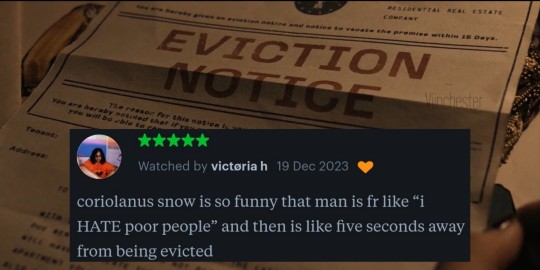
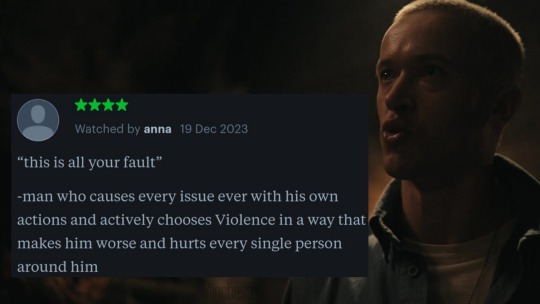


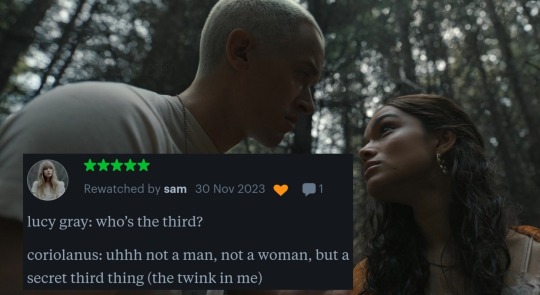
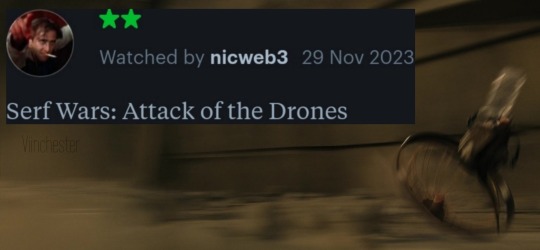
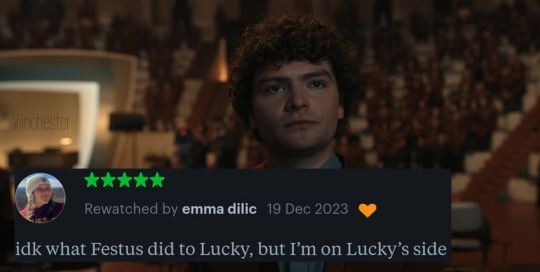

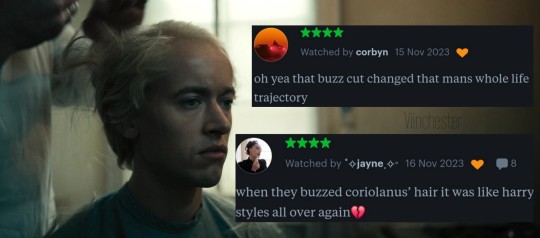
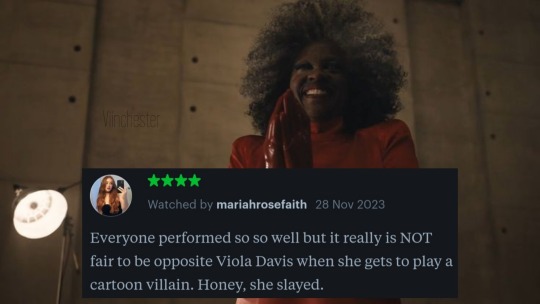
#The Ballad Of Songbirds And Snakes#TBOSAS#The Hunger Games#THG#The Hunger Games: The Ballad Of Songbirds And Snakes#THG:TBOSAS#Letterboxd Reviews#The Ballad Of Songbirds And Snakes Reviews#TBOSAS Reviews#Hunger Games#Coriolanus Snow#Lucy Gray Baird#Dr. Gaul#Volumnia Gaul#Dr. Volumnia Gaul#Lucky Flickerman#Festus Creed#Reaper Ash#Reaper#Festus#Lucy Gray#Tom Blyth#Rachel Zegler#Viola Davis#Jason Schwartzman#Harry Styles#Lucretius Flickerman#Katniss Everdeen#Katniss#Reviews
113 notes
·
View notes
Text
Dr. Volumnia Gaul's world view
(and her pushing that world view unto kids)


Pushing her disgusting beliefs unto children about humanity's "true colors"


The grooming 😖

"mankind's natural state" "what they are all along" "humanity's true colors is that they have no moral compass" "Evil all along" 😑
Imagine being told you are inherently bad. That's what you are deep down and nothing good you do is genuine.
Coryo living in propaganda-filled society and being young, impressionable and seeking some form of control in his life, he's easily malleable to Gaul.

Hobbes considers humans to be naturally vainglorious and so seek to dominate others and demand their respect. The natural condition of mankind, according to Hobbes, is a state of war in which life is “solitary, poor, nasty, brutish, and short” because individuals are in a “war of all against all”. Like Hobbes, Gaul believes that humans have no moral compass unless there are predetermined rules to say what actions are good or bad.
It's sad that he came to believe her towards the end.



Coryo parroting Gaul.
The lesson that stuck to Coriolanus throughout his life and the one that won in the end of tbosas. In my opinion, in the end he believes, he is in need of being controlled to be safe and to have order (paralleling his projection on the Jabberjays). He believes it fully in the end to escape the guilt of what he did. Because if Gaul is right then what he did was just his nature (that he had no choice), that's just what he naturally is all along and so not at fault, that it is simply human nature and he is in need of control. To control himself and to control others from their own nature.
#coriolanus snow#snowbaird#tbosas#lucy gray baird#the ballad of songbirds and snakes#Dr. Volumnia Gaul#Dr. Gaul#believing that Coryo was “evil” from the start and inherently bad is saying Dr. Gaul is right#he was a vain bitchy prick with a prejudice but he was not evil from the start#tbosas meta#thg#the hunger games
45 notes
·
View notes
Text
Y’all what the fuck was Coriolanus even doing. Did I miss something or what did he think would happen to Sejanus after sending that jabberjay recording out ??
Maybe I’m missing part of the story bc I am watching this as an upload on an online website and there was a section where there was just like some foreign language happening so idk.
Also the mockingjays repeating Sejanus cry for help and his ma was literally haunting.
#yah Tim Blyth is hot but Coryo is fucking horrible and degraded idk how so many ppl are attracted to him#this movie is so good but I think I’m gonna need to watch it more than once to grasp what’s happening#tbosas#the ballad of songbirds and snakes#lucy gray baird#lucy gray x coriolanus#lucy gray my beloved#coriolanus snow#coryo snow#sejanus plinth#coriolanus x sejanus#tigris snow#casca highbottom#dr. gaul#president snow#the hunger games
55 notes
·
View notes
Text
Coriolanus kills Dr. Gaul: post-TBOSAS
Coriolanus wasn’t sure why he had named his son Sejanus, really.
Actually, that was a lie. He knew exactly why he had named him that. As a punishment. A reminder of his worst mistake- not just the betrayal, but the lies. He had lost both Sejanus and L-
Do not say her name. Not even in your mind.
Coriolanus clenched and unclenched his fists. After all this time, it still haunted him so. It’s dangerous for an obsessive man to fall in love. She may be alive, or she may be dead, but either way she’d certainly live on in his memories.
In his dreams.
The guilt was unbearable. Much as Ma Plinth annoyed him, she was the closest thing to a mother he had had after his own died. She looked at him like he was her son, and it was like a knife to the gut every time. He had to do something to alleviate it- this pain.
Well, truly, not all the blame could fall on him. He had expected Sejanus to be taken back to the Capitol, maybe his father paid some people off, and that was it. Instead, a few days later, he was standing vigil at his execution. Dr. Gaul, the sadist. He had never forgotten the delightful glee she exuded as Clemensia had been bitten by those snakes. She did not value human life in any capacity; more than being the harbinger of violence, she relished it. Gloried in it. Had been ready to sacrifice his life for the sake of her twisted games.
She had to die. Coriolanus had long desired to end her life, and now, when all others would be preoccupied with the Hunger Games celebrations, would be the perfect time to carry out his plan.
He almost laughed at the position he found himself in. While several sweet maids prepared him for the ball tonight, his mind was plotting murder. He wondered how little they knew about the man they served; he wondered how little they knew about human nature itself.
He admired himself in the mirror. He wore a cobalt trenchcoat over a pale gold button-up and pants. His hair was beginning to curl at the ends again, and Coriolanus made a note to get them fixed later. Those curls were a sign of his youth; they brought back memories he’d rather not revisit anymore than he had to. Torturous sad and wet dreams in the night were bad enough.
He smoothed down a small crease on his shirt and gave a practiced smile. “You’ve outdone yourself ladies,” he said smoothly, and all three ladies preened. He didn’t mention their comical feathers and outlandish makeup that made them look like clowns. Best to keep those close to you on your side.
The first party hosted for the victors. All part of the show; it disgusted him really, that the people were so immune to it. He would never be immune to the deaths of others. He counted every life that had been lost in that arena, and though he deemed it a necessary evil to prevent more deaths, he’d begun counting their lost lives as part of his kill count.
Hundreds of deaths had come at his hands. And there would be hundreds more.
Innocent children. But at least he would be doing some good. At least he would be freeing Panem from Dr. Gaul’s brand of torment.
What a terrible waste this ceremony was. Coriolanus couldn’t stop it, couldn’t repress that desperate part of him that still lived in the post-war times when there was nothing to eat but cabbage stew. To see the way the Capitol citizens flaunted their wealth…he wished to give them all a good punch straight to the teeth.
Coriolanus gave his ridiculous speech, being sure to use the words “honor” and “celebration” and “delight” and “victory” a thousand times to get it to sink in. He met the victor, a big burly male who reminded him of Reaper, which reminded him of the tenth hunger games, which reminded him of its victor-
For fuck’s sake. Coriolanus flexed his hands again. Just a little while longer he had to stay here before he could retreat to his chambers. Just another hour or so of entertaining these sycophantic fools who saw him as their social climbing ladder or worse, a pretty object to lay with. He drank one glass of wine, willing his face to go expressionless as women pawed at him, unbuttoning his shirt. He said calmly, “I’m not interested, ladies. I’m still mourning my wife, I’m afraid.” Lies. He had murdered his wife in cold blood four years ago. He had despised that bitch. The only good thing she had given him was his lovely son, who was currently being looked after by nannies. He didn’t want to overwhelm him with huge crowds yet. The woman murmured in disappointment, but they were only replaced by more. He hated how raunchy these parties got, hated that they expected him to join in the festivities. No, he would never touch them. There was only one person he’d willingly partake in such actions with, and she had scattered to the trees.
Unable to bear it, Coriolanus left the party a lot earlier than he’d intended. He walked away from the main hall, seeking the men’s bathroom. He heaved into the sink, the memories flooding him. Lucy Gray’s smile, Lucy Gray’s laugh, Lucy Gray playing the guitar, Lucy Gray Lucy Gray Lucy Gray Lucy Gray Lucy Gray Lucy Gray Lucy Gray Lucy Gray Lucy Gray Lucy Gray Lucy Gray Lucy Gray Lucy Gray Lucy Gray Lucy Gray-
“Coryo,” a soft voice called. Coryo whipped his head around wildly. He could’ve sworn he heard Lucy Gray’s voice. But…no. He must have been going crazy.
He walked back to his room, feeling like there was a heavy weight on his body. The tears fell down his face, and Coryo didn’t bother to stop them. Most days he could get by without thinking of her, but on the days that it hit hard, he became absolutely miserable, and he could not focus for the rest of the day. He had to do something. Nothing like bloody murder to get your lost love out of your mind.
This one would be for her. His Lucy Gray, who Dr. Gaul had taken from him.
Were it not for Dr. Gaul, Sejanus wouldn’t be dead. If he hadn’t died, Coryo wouldn’t have lied to Lucy Gray. If Coryo hadn’t lied to Lucy Gray, she wouldn’t have run into the forest.
Flex. Unflex. Coryo took a deep breath, trying not to think of her earthy smell and warm smile, but he could sense it so clearly in his mind it was like she was there.
What method would he use to kill Dr. Gaul? How poetic would it be if he killed her with her own mutts? But he was sure she had gone to great lengths to ensure that they wouldn’t harm her.
But how sure could she be, really? They were animals, right? Once you took them out of their controlled setting, all bets were off.
So, Coriolanus armed himself with his old Peacekeeper rifle. He sometimes kept it on him, for nostalgic purposes. Part of him believed nostalgia was only fit for a fool, but it didn’t hurt that the gun still worked.
He walked down to the labs located in the basement of this very building. Found Dr. Gaul tinkering with something, even this late at night. Twisted psychopath. “Ah, Coriolanus! Don’t you have a lovely party to be at?”
Coriolanus gestured down at himself, his hair mussed up, the top of his chest peaking out, the belt of his pants loosened. “Doesn’t it appear as if I have partied enough?”
Dr. Gaul let out a chuckle. “All those ladies jumping on you as soon as they get a chance, You must power through, and remember all this is part of the…”
Coryo smirked. “Dance. All part of the dance.”
A dance that would end tonight. Dr. Gaul clapped her hands delightedly. “Come, look at these lovely new mutts I am working with.”
Coriolanus looked over at them, pretending to be interested. In reality, they looked quite foul, with their mottled green skin and a forked tongue resembling that of a snake’s, only much longer. “Are those…chameleons?” Coriolanus asked with forced calm. In reality, the mere thought of these animals made him sick. This was the Capitol; such wild creatures shouldn’t exist in a civilized place.
“Partially,” Dr. Gaul said. That manic smile was on her face again. “Part chameleon, part snake, part my artwork. I call them chamelonakes.” Dumb name, Coriolanus internally scoffed. “They are venomous, can camouflage themselves, and their leaping capacity is much improved. They trust me, of course, but all others, they are trained to kill.”
Coriolanus swallowed. “How do you? You know. Get them to trust you.”
Dr. Gaul looked at him incredulously. “Why, the same way you’d get any human to trust you. By getting to know them.”
Hmph. Well, he didn’t have time for that. What if he went for a different strategy? He always kept a vial of poison on him ever since he’d killed Livia Cardew. You never knew when you would need to poison someone. While Dr. Gaul was busy cooing over some creatures, Coriolanus slipped poison into the food labeled for them. “Really? It’s that simple? They look very…dangerous.” Dr. Gaul simply laughed. “I thought you would’ve learned by now, Coriolanus, that animals are easily baited by food and basic necessities. Allow me to demonstrate.” She grabbed the food and stuck her hand into the cage with her bare hands. Coriolanus wondered if the creatures would even sense the poison, or if the poison he had used would even be poisonous to them.
He got his answer moments later as no less than three chamelonakes crunched down onto Dr. Gaul’s arm. Coriolanus wasn’t a vicious person, but he had to admit, some savage part of him reveled in Dr. Gaul’s scream, even as he backed several paces away.
“How does it feel?” Coriolanus asked. “To be bit by a venomous snake.” Dr. Gaul blinked. “What did you do?”
Coriolanus shrugged. “Nothing anyone will ever figure out. Just like they never figured out what happened to Clemensia.” He sneered at her. “You thought you were untouchable, indestructible, did you? So unbelievably arrogant; that was your demise.” The chamelonakes continued to crowd around the scientist, inspecting her suspiciously.
“I made you,” Dr. Gaul hissed. “Without me, you would be nothing.”
Coriolanus laughed mirthlessly. “No, you almost got me killed multiple times. You lost me my best friend and my girlfriend. You’re out of control; you relish violence, you sadistic witch. What Panem needs is control, not war. But you would be perfectly happy with another war, wouldn’t you, Dr. Gaul? More bloodshed for you, more dummies to experiment with. No longer. I always had it in me to be President; don’t fancy yourself some great guardian, Dr. Gaul. I will ensure your name is erased from history.”
“Without me, you’d still be rotting in District 12,” she spat.
Coriolanus only smiled. “You’re just angry because I’m better than you are now. Goodbye, heathen. No one will miss you. I’ve won.”
And just as he did after Livia had died before him, he said quietly, “Snow lands on top. Isn’t that how the saying goes?”
Dr. Gaul’s eyes widened before the light left them.
Coriolanus left her there. Some guards would find her in a few minutes, dead. They’d assume her mutts had killed her at last, and they’d be correct. No one would ever realize the role he had played in making it happen.
Snow lands on top.
28 notes
·
View notes
Text
Welcome the Academy!!📚
An important message from the Capitol 📣
Text 717-THG-MKJY to enroll in the Academy!! (+1-171-844-6559)
#thg#the hunger games#tbosas#hunger games prequel#the ballad of songbirds and snakes#ballad of songbirds and snakes#news#Tbosas update#coriolanus snow#sejanus plinth#casca highbottom#dr. gaul#tom blyth#viola davis#josh andres rivera#peter dinklage
113 notes
·
View notes
Text
I’ve seen a lot of people saying that Dr. Gaul made Snow the way he is, and I want to push back against that a little bit. Obviously, she helped him along. Certainly, she groomed him. But he was made long before that. He was made by the war.
Right from the start of the book he is paranoid, and he desires the control he was stripped of during the war. And the trauma of the war haunts him for the entire book. He thinks about the horrible things he went through--the loss and the grief--and the equally horrible things people around him did to survive—the cannibalism and the killing—and it terrifies him. When he kills Bobbin, that terrifies him, too.
What Dr. Gaul does is simply stoke the fears the war already created in him, by convincing him that the war will never truly be over, because humanity is inherently violent. She uses his own paranoia and need for control against him, but those aspects of his psyche were already present long before she showed up.
99 notes
·
View notes
Text
youtube
**some of my tags below mildly spoil the video’s content; if you found this post through any of them, do proceed with caution!**
I don’t watch video essays very often, but imho this one is fantastic—so I thought I’d share here!!
The video analysed the purpose, function(ing), and long-term effect of the Hunger Games on both Capitol and District citizens, in ABOSAS and the main series, and broke down its structure (and by extension, Panem) to A TEE.
Do check out the channel as well!! There’s another video made on Wandavision that I really like also (translation: I FELT SEEN), and in general I quite like the way they structure their arguments/points.
#the hunger games#panem#video essay#rhae rants#film / the hunger games (2012)#film / the hunger games: catching fire (2013)#film / the hunger games: a ballad of songbirds and snakes (2023)#on empathy#on dehumanisation#katniss everdeen#peeta mellark#caesar flickerman#effie trinket#haymitch abernathy#dr. gaul#coriolanus snow#lucy gray baird
19 notes
·
View notes
Text
thinks abt how Gaul intended for there to be no victor in the 10th Hunger Games and Snow's shallow young love for Lucy thwarted her plan, and then 64 years later, Katniss and Peeta fully intended to leave the 74th Games victorless
#jay jabbers#everlark#the hunger games#katniss everdeen#peeta mellark#dr. gaul#coriolanus snow#lucy gray baird#snowbaird#a ballad of songbirds and snakes#abosas
283 notes
·
View notes
Text
Did anyone else notice that Coriolanus has kind of prophetic dreams or am I just thinking way too much about because like,,,,
I remember that he had one dream that alternated between him kissing Lucy Gray and feeding Dr. Gaul's snakelets and I was like, "oh. That's like the choices he has to go further in life". He could either feed Dr. Gaul's snakes - aid Gaul in her cruel ideal of the world - or go with Lucy Gray and potentially live a life completely different from the one we know, a life where he's with Lucy Gray and he's happy with her, where he doesn't want power or success or status, where all he wants is love.
Obviously there are other interpretations to this, but this was my take on his first dream. Or maybe I'm looking too far into it idfk but anyway.
He has another dream where he's back in the arena with Sejanus, and Sejanus is sprinkling the breadcrumbs over Marcus's body and is oblivious to Dr. Gaul's rainbow snakes that are surrounding both him and Coriolanus.
Coriolanus is screaming at him to get up and run away I think, but Sejanus can't hear him, and eventually the snakes reach them and Sejanus "had plenty of screaming of his own to do".
Since Coriolanus is generally associated with snakes, and Sejanus's fate is ultimately the result of Snow's decisions, I think this was hinting to Sejanus being cornered by Coriolanus and unaware that the boy he called brother (😭) was going to be the reason he died.
Again, there are many interpretations of this lol, I just thought this was interesting. Uhhhh yup 👍
#Coriolanus Snow#Tbosas#hunger games#lucy gray baird#sejanus plinth#Dr. Gaul#Yeah idk guys I just think way too much about this series. Wtf#the ballad of songbirds and snakes
29 notes
·
View notes
Text
My Views on Coriolanus Snow and The Ballad of Songbirds and Snakes
This is a Harry Potter blog, but not even Harry Potter can capture my mind and soul like the Hunger Games can. I’ve read TBOSAS three times and I have some opinions to share. My conclusions will be based on the book since I didn’t particularly like the movie.
Note: I haven’t read the book in about 2 months so I apologize if anything I say is blatantly incorrect. I don’t mind if anyone disputes what I say, but please be respectful.
And of course, SPOILERS BELOW THE CUT!
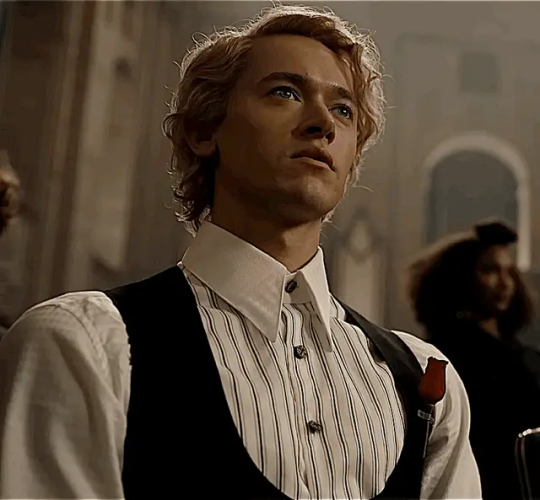
Point 1: Coriolanus cared for Lucy Gray in his own weird way, but he never loved her
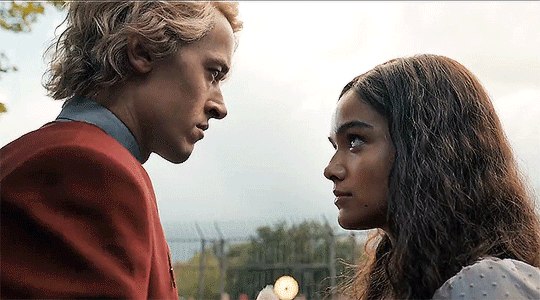
After reading the book for the second time, I thought that Coriolanus never loved Lucy Gray and that he was only ever using her. After reading it for the third time, I wouldn’t go so far as to say that he was only ever using her. I think that he genuinely cared for her before and during the 10th Hunger Games. For example, he felt disturbed at how she had nothing to eat and didn’t talk about what happened to Clemensia since she had bigger problems than he did. Also, Coriolanus kissing Lucy Gray in public during their final goodbye before the Games was one of the only moments where he broke from his true character (and this missing scene from the movie is one reason why I didn’t particularly like it). Coriolanus’s number 1 priority was maintaining his public image, so the fact that he kissed a District girl in public was a big deal.
However, I don’t think he truly loved her since he viewed her as a possession. Coriolanus admitted to having an obsessive nature, which extended to him being obsessed with her. The first huge red flag in his relationship with Lucy Gray was when he gave her a matching rose before the interviews as a “reminder of who Lucy Gray belonged to.” Throughout the novel and especially after the Games, Coriolanus continually refers to Lucy Gray as “his girl.” He was also perpetually jealous of Billy Taupe even though she assured him time and time again that she loved only him. The most profound statement that proves his possessive nature towards her is when he thinks, “In some ways, it had been better to have her locked up in the Capitol, where he always had a general idea of what she was doing.”
Coriolanus was someone who valued stability and control, while Lucy Gray was fiercely individualistic. So please stop thinking that it could’ve ever worked out between the two of them.
Point 2: Lucy Gray is not a pick me girl
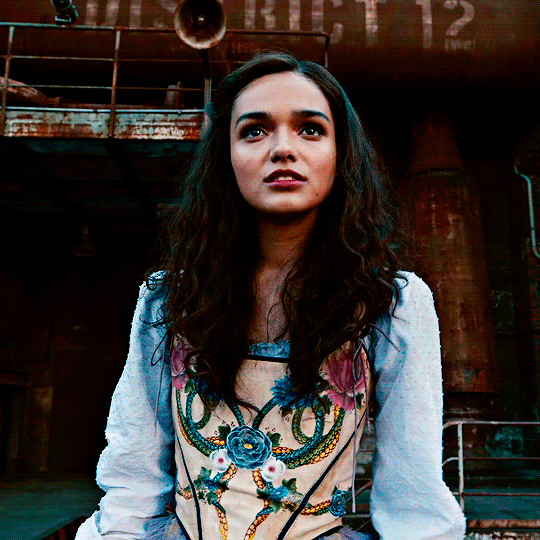
At least for the first few months after the book came out, people were claiming that Lucy Gray was what we would consider a pick me girl. The first time I read the book, even I thought that she gave off the vibe of not being like other girls. Lucy Gray emphasizes that she and the Covey were neither District nor Capitol; they’re just the Covey. But after reading the book for the second time, I realized that she only held this view because she was proud of who she was. At the same time, she didn’t think that being Covey made her any better or that District people were worse than her. She also said, “People aren’t so bad, really. It’s what the world does to them.”
I think that the “not like other District people” view originated from Coriolanus. From the beginning, Coriolanus viewed people from the Districts as brutish and subhuman. He used Lucy Gray’s identity as Covey as an argument that she wasn’t like the subhuman District people; she was special and one could even argue that she was even Capitol. It was unfortunate that she and the Covey were rounded up into District 12. I think he developed this idea as both a way to gain sympathy from Capitol viewers and to convince himself that he wasn’t in love with a “worthless” girl. He also would’ve disagreed with Lucy Gray’s quote since he viewed only District people as truly bad to the core.
Point 3: Lucy Gray survived
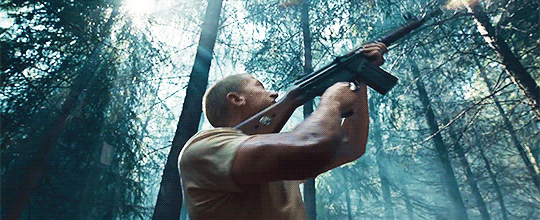
I don’t think we will ever get an answer as to what happened to Lucy Gray. I think her fate is supposed to remain a mystery, just like Wordsworth’s Lucy Gray’s fate remained a mystery. Nonetheless, I personally believe that she survived.
Coriolanus hated the mockingjays because they were abominations that resulted from the breeding of high-tech Capitol jabberjays and the local District mockingbirds. And who is similar to the mockingjays? Lucy Gray. She was a songbird who wanted to be free and never wanted to be controlled, while Coriolanus wanted to control everything. Just like the mockingjays came to be and flourished in District 12, Lucy Gray also survived. She was a clever bird who survived the Hunger Games and tricked Coriolanus.
I know that my opinion is based all on symbolism, but many aspects of Suzanne Collins’s writing are symbolic.
Point 4: Coriolanus never cared for Sejanus
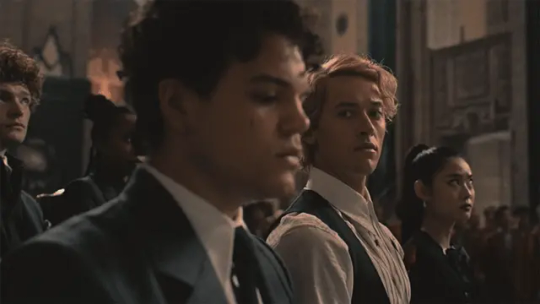
First of all, let me say that the movie did Sejanus DIRTY. They portrayed him as a pain in the ass (he was that in the book, but he was so much more as well) and I even saw some people saying that he deserved what he got. No one says that to my Sejanus.
Anyway, back to the point: Coriolanus always viewed Sejanus as the bane of his existence. Sejanus was going to steal Coriolanus’s fortune and he always stole Coriolanus’s spotlight. Coriolanus thought that Sejanus brought the tributes food to take the attention away from him; not for one moment did he think that it was because Sejanus had a heart of gold. He viewed Sejanus’s attachment to District 2 as stupid since he should’ve felt lucky to have a comfortable life in the Capitol.
Yes, Coriolanus jumped off his bunk and threw his arms around Sejanus when he arrived in District 12. But it was not because he was genuinely happy to see Sejanus; he was happy to see Sejanus because he reminded him of home. After their first conversation in District 12 was over, Coriolanus admitted that the news that the Capitol didn’t hate him was what brought him back to life. And while they were “friends” during their time as Peacekeepers, Coriolanus felt like he always had to get Sejanus out of trouble. Coriolanus was constantly watching over Sejanus to ensure he wasn’t communicating with the rebels and he was trying to convince Sejanus not to do anything extreme. This feeling got so bad that he wanted Sejanus out of his life.
One thing I will say is that I don’t think that Coriolanus wanted Sejanus dead, per se. When he recorded Sejanus’s plans using the jabberjay, Coriolanus thought that Strabo would donate tons of money and have Sejanus removed from District 12; he didn’t think he would be killed. I think Coriolanus felt slightly guilty for essentially putting the noose around Sejanus’s neck, but he also thought he was doing Sejanus a favor. He had saved Sejanus from dying multiple times before that, so it was only a matter of time before Sejanus died. So no, Anus^2/Snowjanus wouldn’t have worked out either.
Point 5: Coriolanus wasn’t completely evil from the beginning
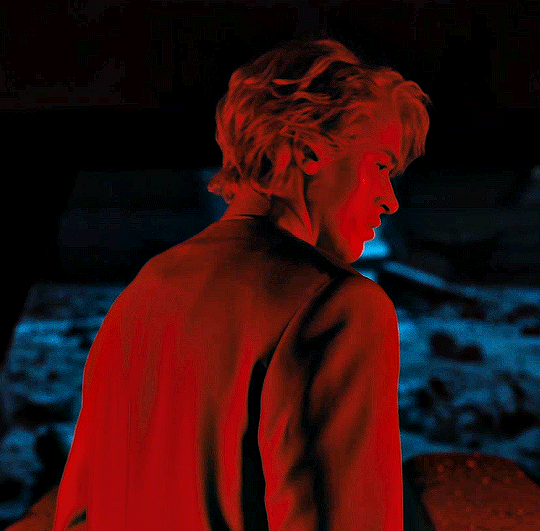
I’ve seen people saying that Coriolanus was always evil or that he wasn’t even evil in TBOSAS. My viewpoint is in the middle between these two opinions. I think Coriolanus had messed up thinking from the very first chapter, but he wasn’t evil. He did have some morals, like genuinely caring for Lucy Gray’s well-being and feeling guilty over Clemensia’s snake bites. I don’t think he actually wanted to kill Sejanus or attempt to kill Lucy Gray, but he would kill anyone if it meant he would make it out alive and unharmed. I think Coriolanus would’ve eventually turned evil as he grew older even if the 10th Hunger Games had never taken place. However, I think that Dr. Gaul sending him to District 12 accelerated his path to becoming evil. By the end of the book, Coriolanus had devolved into the primal state resembling humans living without a social contract.
Point 6: The Ballad of Songbirds and Snakes isn’t a romance
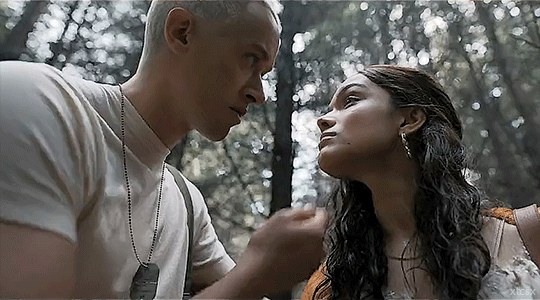
Point 5 brings me to this point: TBOSAS is a piece on human nature and political control. There is romance and I will admit that I giggled and kicked my feet as I saw Coriolanus kissing Lucy Gray like a starving man (this was despite me already knowing everything that would happen). The main actions of TBOSAS actually revolve around Dr. Gaul’s points on chaos, contract, and control (which originated from Leviathan by Thomas Hobbes). Without a government and without a social contract, people are primal creatures and will kill at a whim. The only way to civilize people is to place them under a social contract, and thus there must be a strong government to enforce this contract and control the people. Coriolanus took Dr. Gaul’s lesson to heart and genuinely believed that only the Capitol could hold Panem together. Throughout the book, Coriolanus starts from a person with questionable thoughts to a person with no morals whatsoever. The downward spiral of his moral compass truly begins when he arrives in District 12, but he loses all morals once he leaves for the woods with Lucy Gray and abandons civilization. Therefore, Coriolanus fell victim to Dr. Gaul’s thesis.
GIF Credits
Intro: @aemondtagaryen
Point 1: @xthecaptainssaviorx
Point 2: @myrcella-lannister
Point 3: @kvtnisseverdeen
Point 4: @clemensiadovecotes
Point 5: @fyeahvillains
Point 6: @xthecaptainssaviorx
#coriolanus snow#coryo snow#coryo#sejanus plinth#sejanus#lucy gray baird#lucy gray#dr. gaul#volumnia gaul#the ballad of songbirds and snakes#tbosas#president snow#the hunger games#hunger games#thg#opinion#it's not my fault tom blyth is hot#mockingjay#meta#tbosas meta#hunger games meta#thg meta#the hunger games meta
38 notes
·
View notes
Text
Clerk Carmine and Maude Ivory probably weren’t actually entered into the reaping pool when they came of age, because if they were tributes, it would have drawn attention back to Lucy Gray and the 10th Games. A last inadvertent bit of protection from her.
If Katniss really had been one of their descendants, then, well, that was just Dr. Gaul and Snow just setting the timer on their messed up creation of the Games.
#clerk carmine clade#maude ivory#maude ivory baird#lucy gray baird#katniss everdeen#coriolanus snow#volumina gaul#dr. gaul#thg#the hunger games#tbosas#the ballad of songbirds and snakes
49 notes
·
View notes
Text
I swear Suzanne Collins read ACOTAR, because the parallels between the ACOTAR series and TBOSAS are craaazy.
Feyre loved Tamlin, who is a musician JUST LIKE LUCY GRAY, and she was also besties with Lucien, who is hella unhinged, very smart but can't keep his mouth shut (like when he got his eye cut out for snapping at Amarantha), he can be like the Sejanus. Feyre does everything she can to free Tamlin from his tormenter (her own version of the Hunger Games). Then after that, she returns to the Spring Court (Districts), but she had to kill two faeries, and she's not the same, she feels like there's darkness inside her that no one can understand (but Tamlin absolutely can, he has been forced to kill too), but Rhysand grooms her like Dr. Gaul grooms Coryo when he takes her to the Night Court (Capitol) and convinces her that he can understand her darkness and Tamlin can't, and Feyre causes a Spring Court genocide (kind of like Coryo perpetuating the Hunger Games when he became president). Only, Suzanne wrote it like a villain origin story, which is correct. Girl...
#acotar#tbosas#feyre archeron#tamlin#lucy gray baird#sejanus plinth#coriolanus snow#suzanne collins#lucien vanserra#feylin#anti feysand#snowbaird#dr. gaul#anti rhysand
22 notes
·
View notes